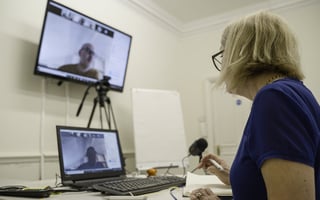It is the most wonderful time of the year.
‘Be as rude to me as possible’.
An unusual way to prepare for a media interview.
But it’s the approach one high-profile spokesperson encouraged his team to take with him ahead of challenging media interviews.
And is one of the insights shared in a fascinating podcast that lifts the lid on how spokespeople prepare for one of the most gruelling types of media interviews – the morning round.
This is the term for the series of interviews politicians give to TV and radio stations each morning for their breakfast slots.
Often starting at 6am and going on for more than three hours, it’s a tough challenge even for someone who has done it many times - and could be considered a thankless task.
But what is said and covered can often set the news agenda for the day.
Grant Shapps is a Conservative politician who, during his time in government, previously featured in our media training blogs.
He spoke to Westminster Insider about how he prepared for one of his many morning round appearances.
“You have to bother to take the time to read the material on whatever you are going to be talking about, so you have the confidence to discuss it,” he said.
“The problem with the morning round is you don’t know what that material needs to be.
“You have to know about absolutely everything going on in the country, in the world and in the government that day.
“Once the media know you have a reputation for not doing your homework, they will pummel you for it.”
So, how do you prepare for such a broad topic area?
“You can’t prepare in the morning – you have to have done that the night before,” Mr Shapps said.
“About 6pm, I would begin hassling No 10 for the lines to take, and their press team would pull together about a 20-page document. And it would have all the lines on the big issues of the day.
“And then about 7pm or 8pm, I would convene my team. My instructions were for them to give me a tougher ride than I could possibly, conceivably get on the morning round.
“You give your team permission to say the rudest things possible to you, beat you up and be quite offensive.
“If you could survive that, then you know you had a reasonable chance of surviving the morning round.”
Mr Shapps went on to add two more of his rules for this media interview format.
He said: “The second thing – and it sounds like a contradiction – is don’t just parrot it out. If you do, you just sound like a machine.
“And it is where politicians get into the stupid and classic lines of ‘That’s a very good question, but the one you should be asking me is…’, which just doesn’t work.
“The other thing is be a human being. Have a conversation.”
We will return to this advice in just a moment.
But Mr Shapps is not the only politician to share his thoughts and experiences on the podcast.
Former Labour shadow minister Jonathan Ashworth also spoke about how tough it can be to face so many media interviews in a short space of time.
He said: “You start a morning round at about 6am, and you run through Sky News, BBC Breakfast, Good Morning Britain, Today, Talk, GB News, LBC, Radio 5 Live, and by the end of it, you are finishing at about 9.20am.
“That’s three hours. And I used to say it is like sitting your exams live in public.”
He added: “There are genuinely times where you give an interview and your mind goes blank. Because, if you started at 6am, you have probably been up since 4.30am.
“Sometimes, in the back of your brain, you can remember the fact, but for whatever reason - in that moment - you slightly go blank.
“So, you have to keep repeating the same answer, which you know the viewers are tearing their hair out and saying, ‘typical politician’.
The discussion also covered a question that often comes up when politicians are in the media spotlight – the one that asks them for the price of a pint of milk, loaf of bread, or tin of baked beans.
It is fair to say Mr Ashworth is not a fan.
He said: “What I do sometimes think is a bit mean from journalists is the sort of ‘Can you tell me what the price is of a pint of milk?’.
“Those questions are set up to make the politician seem out of touch.
“And, sometimes, politicians can’t always remember what the price of milk is. People who have busy lives are not always on top of every little bit of detail.”
It’s a fascinating podcast episode.
But what does this mean for other media spokespeople?
Well, while you or your spokesperson may not face a grilling quite as intense as the nation’s politicians, there are some crucial media training lessons here.
Preparation
This is something we always stress during our media skills training courses – it lies at the heart of media interview success.
You need to spend time in advance ensuring you know the message you want to get across.
And you must try to anticipate the difficult questions and wider issues that could be brought into the conversation.
But the 20 pages of briefing Mr Shapps highlighted is excessive for most media spokespeople.
Not only does that level of preparation do little for pre-interview nerves. But with so much covered, it will be tough for spokespeople to recall talking points when the pressure is on.
And if they can, it can lead to a stilted, robotic delivery.
We recommend preparation takes around 20 minutes to half an hour for most media interviews.
Practice
Practice and preparation are closely linked.
Now, we don’t think spokespeople need colleagues to be as ‘rude’ and ‘offensive’ to them as possible, like Mr Shapps discussed.
But they need colleagues who can ask those awkward questions and provide honest feedback about how they handled them.
Alternatively, media interview practice can be carried out with our new AI training companion -Thirty Seven.
Spokespeople can carry out interviews on their subject with our AI-powered journalists and then receive instant feedback – based on our unique methodology and extensive experience - about their performance.
All our media training delegates receive complimentary access to Thirty Seven for 30 days after their course.
Be human
We love this advice from Mr Shapps, and it is something we always stress during our media training courses.
Spokespeople should not look to script answers and memorise word-for-word what they intend to say.
Creating a natural-sounding conversation in an interview is vital.
And it involves listening carefully to the question and being confident enough to adapt and edit what you plan to say in response.
It also involves using everyday language, rather than jargon, corporate speak and phrases like, ‘“in the spirit of candour”, which politicians have been known to use.
Multiple interviews
The morning round is a gruelling media interview schedule.
But, away from politics, it is not unusual for other media spokespeople to face multiple interviews in quick succession.
Our advice is to consider how you can factor in time between each one for a quick review if you have several interviews booked in a row,
It only needs a few minutes and should focus on what went well and what could have gone better.
But it could prevent spokespeople from making the same mistake throughout. Or it could help them find a way of adding real emphasis to the key message they need to land.
And a break will enable them to get their energy levels back up for the next interview.
Evasive
There is lots of focus in the podcast on politicians trying to evade uncomfortable questions and “pivot” to what they want to discuss.
During the podcast, Good Morning Britain host Richard Madeley described this approach as “extremely frustrating” and a “smack in the face for viewers”.
We agree. It is a flawed tactic that leaves spokespeople looking cowardly. And that refusal to answer often becomes the main talking point and focus of the interview for the audience.
This can be avoided with good preparation - anticipate difficult questions. And prepare how you would respond.
For example, if your company has been in the news or criticised on social media recently, that could be brought into the conversation. If the CEO’s pay or bonus attracted controversy in the past, then that too is likely to become a line of questioning, particularly if they are giving the interview.
In the interview, use the bridging technique.
It helps spokespeople control the conversation and steer it away from difficult questions to what they want to discuss. And when used well, the audience is unlikely to notice.
The spokesperson must answer or briefly acknowledge the question and then use a bridging phrase to steer the conversation to safer ground.
Here are a few bridging phrases to help you prepare.
However, the key to good bridging is for spokespeople to develop their own words and phrases they feel comfortable using.
Brain fade
Let’s talk about those moments where your brain goes blank – something Mr Ashworth said is a symptom of doing so many interviews in quick succession.
It is a terrifying scenario for any media spokesperson and can happen whether you have one interview or 15.
Delegates often ask during our media skills training courses – “What happens if my mind goes blank?”
One way to reduce this happening is to avoid the overpreparation we discussed earlier.
If it does happen, be honest, say, “Sorry, I’ve lost my train of thought,” and ask the journalist to repeat the question.
You won’t be the first person this has happened to, and your audience will probably understand and sympathise.
It is also worth remembering that although we started this blog by discussing political interviews, you are not a politician.
So, in most cases, all the interviewer wants from you is a few interesting facts and thoughts – backed up with an example or two.
It’s the presenter's responsibility to keep the show on the road and avoid dead air during live interviews, meaning they are likely to jump in and keep things going if you get stuck.
Media First are media and communications training specialists with nearly 40 years of experience. We have a team of trainers, each with decades of experience working as journalists, presenters, communications coaches and media trainers.
Click here to find out more about our media training.
Subscribe here to be among the first to receive our blogs.






